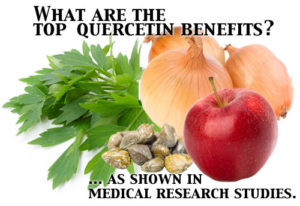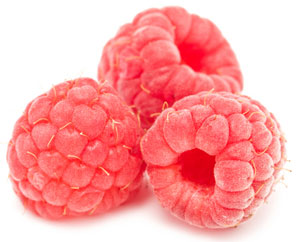 There are a variety of ways that quercetin has shown to be beneficial to human health. WebMD provides a list of potential medical treatments and applications:
There are a variety of ways that quercetin has shown to be beneficial to human health. WebMD provides a list of potential medical treatments and applications:
- Treating Atherosclerosis
- Lowering High Cholesterol
- Preventing Heart Disease and Circulation Issues
- Diabetes
- Cataracts
- Relieve Hay Fever Symptoms
- Peptic Ulcers
- Schizophrenia
- Reduce Inflammation
- Relieve Asthma
- Gout
- Viral Infections
- Chronic Fatigue Syndrome
- Cancer Prevention
- Treating Prostate Infections
- Increase Endurance in Sports
In regards to endurance in athletes, BerkeleyWellness.com reports that quercetin shows to improve athletic performance. It helps boost energy, minimize fatigue, shorten recovery time and improve immune response as well as bone health.
Research Challenges to Find Quercetin Benefits
 There have been numerous research studies on the possible health benefits of quercetin. However, there are challenges…
There have been numerous research studies on the possible health benefits of quercetin. However, there are challenges…
Some of the clinical trials produce inconsistent and varying results. Several show no measurable benefits. Furthermore, it is difficult to determine which flavonoid or antioxidant is causing the result. Plus, most studies have been conducted on animals and not yet on humans.
That said, quercetin is one of the most studied antioxidants because it is found in many fruits and vegetables. Many researchers believe there is potential.
For example, the University of Maryland Medical Center states that quercetin may help protect against cancer and heart disease. This flavonoid has shown to inhibit cancer cell growth in the colon, breast, prostate, ovarian, endometrial and lungs. Additionally, it can reduce blood pressure in hypertensive patients and lower atherosclerosis risk.
Quercetin and Anti-Cancer Benefits
 In the same area of research, Oregon State University Department of Food Science & Technology studied raspberries and discovered that they have potential as an anti-carcinogen.
In the same area of research, Oregon State University Department of Food Science & Technology studied raspberries and discovered that they have potential as an anti-carcinogen.
Another clinical trial, not yet completed, studies the effect of quercetin on green tea polyphenol uptake in cancer patients.
Quercetin shows that it actually enhances the anticancer effects of green tea.
Quercetin as an Antihistamine
The Medical Center also points out is that quercetin is an antioxidant that can neutralize free radicals. It has the ability to stabilize the histamine-releasing cells and therefore acts as a natural antihistamine. This is why many patients look to quercetin to relieve allergy symptoms like a runny nose, watery eyes, hives and swelling.
Nutritionist Kelsey Marksteiner, RD. wrote an article titled, “Can Quercetin Help Heal a Leaky Gut?”. She says that intestinal permeability is partially caused by unstable mast cells in the gut. Since quercetin stabilizes mast cells and prevents histamine release, it can essentially “seal” the gut barrier.
500mg supplements can be easier than eating 1 onion a day
An undergraduate research journal titled the Journal of Young Investigators makes a noteworthy point. Although many people believe that quercetin protects against many diseases, researchers have not yet determined its absorption rate. That said, they are still trying to determine whether or not the flavonoid actually has to be absorbed in order to have positive effects on the body.
Is absorption a determinant in quercetin’s beneficial effectiveness in disease prevention? Then, we also need to pay attention to the heating and storage of quercetin-containing foods. These factors can change the amount of the flavonol in foods.
According to PubMed, “Onions and tomatoes lose between 75% and 80% of their initial quercetin content after boiling for 15 min, 65% after cooking in a microwave oven, and 30% after frying.”
Brain Health Benefits?
According to PubMed, quercetin has also shown to reduce learning and memory impairment in rodents. In regards to neuroinflammation, Examine.com states that quercetin can act as an anti-inflammatory in the brain. Therefore, it helps to protect against Alzheimers and Parkinsons.
The Benefits of Quercetin as a Phytonutrient
As if we didn’t think quercetin had enough health benefits already, I thought I’d point out something else. Quercetin is a flavonol, which is a polyphenol (a large class of phytonutrients).
Therefore, quercetin also acts as a phytonutrient. According to the US Department of Agriculture, phytonutrients have the following additional potential health benefits:
- Act as Antioxidants
- Boost Our Immune Response
- Help Estrogen Metabolism
- Aid in Cell Communication
- Promote Apoptosis (cancer cell death)
- Detoxify Carcinogens

Do you want more information on research trials? Dr Ray Sahelian M.D. shares information on studies that show potential quercetin health benefits. For example, areas of research include allergies, asthma, blood pressure, cancer, common cold, exercise endurance, erectile dysfunction and hearth disease. In addition, he has information on liver health, prostate health, kidney disease, prostatitis, schizophrenia and skin health.
